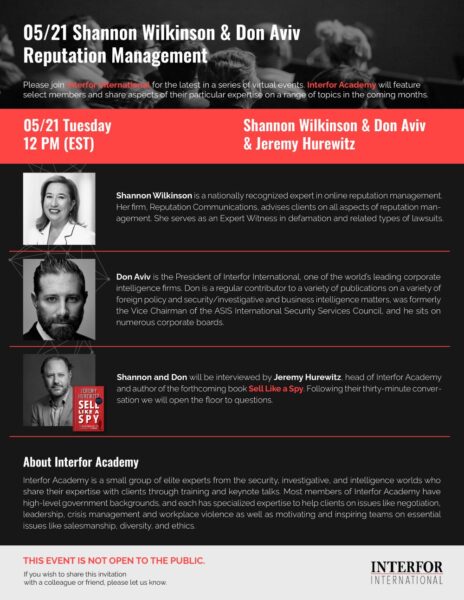
You can view the webinar here.



You can view the webinar here.


Reflecting on the most common reasons why Reputation Communications was engaged by new clients in the last year, I realized those reasons have evolved since I launched this practice over a decade ago.
At Reputation Communications, we work with a select type of clientele: leaders in their fields, VIPs, and rising stars. They require highly customized personal branding on the internet that supports their existing (or soon-to-be) high reputations.
Increasingly, we are being engaged to support the desire of successful clients to curate their achievements and skillsets in professional biographies, websites, portraits, social media and thought-leadership content as they establish new professional or personal goals. In most cases they have built major careers without ever creating anything other than a LinkedIn profile (which we often expand considerably on their behalf), and a company bio.
This represents a growing trend online of taking proactive, rather than reactive, control over how you are perceived on the Internet, where the world-at-large researches you. There are many advantages of taking ownership of your online persona…which may or may not be low-key at the moment but might change at any time.
Our digital magazine, You(Online), features countless strategies we use to mitigate the issues described here, as well as the many content-rich options you have to curate your personal brand on the Internet. The Essentials: Online Reputation Management FAQs, is the best. Good reading.

Over 3 billion people worldwide now use the Internet. The world is truly a stage and you’re on it. How big or small is your role online? And what information can the world find out about you?
In the digital age, search engines ensure that each of us have an online reputation whether we want one or not. Too often, that reputation is misleading or a scattered list of information, adding up to a less than satisfying projection of our real selves.
Here’s the good news: the Internet enables us to build our reputations without a middleman. That is nearly unprecedented in world history. It doesn’t matter who you are or where you live. Simply by going online, you can introduce or reintroduce yourself to the world. By communicating your abilities, world view, skills and talent online, you can attract unlimited connections and opportunities. Fail to establish yourself on the Internet in a way that is appropriate for you, and the world may do it for you. Or it may overlook you.
The Internet enables you to establish your own credible image. To curate your achievements, innovations and mindset in order to attract, develop and profit from relationships that once required an introduction or facilitator.
The Internet also provides you with the opportunity to rebuild your reputation if necessary. If you can’t change the facts, you can proactively present a well-balanced image that effectively counteracts damaging content about you.
Yes, the Internet floods us with daily headlines about the newest celebrity, corporate and every-person’s reputation crisis. And according to many online reputation management firms, we are all one click away from reputational disaster that we may never recover from. (We aren’t…and we can.)
One thing is true: once you have a presence on the Internet, you lose control over how you are perceived.
Unless you have an online reputation management (ORM) strategy.
As a nationally recognized expert in online reputation management, I blog about reputation management to help leaders take a proactive approach to building, managing, amplifying and repairing their digital reputations. My mission is to show you how to make the Internet a valuable ally for achieving your goals. I also want to help you prevent reputational risks before they become problems.
If you are a CEO, executive or professional and would like insight and guidance into how to plan an effective reputation management program, please read Reputation Reboot, our free eBook. It is the ultimate insider’s guide and tells you what you need to know about this process before you begin.

The joys of summer vacation season have come to a close — beach days, family cookouts, and long, sun-filled days are making way for cooler weather, changing leaves, and a return to productivity.
For us, September is the New Season, a time during which we refocus. There are more inquiries, new engagements, faster execution of strategic plans, and a lot more content creation. We didn’t stop working in the summer, but we stepped back from ENews, taking time to pause, refresh, and recharge.
As we dive headfirst into this new season, I wanted to share with you what we’ve been working on.
It all goes back to these central tenants of our business — content creation and social media management, which are valued by Google. These have become our most sought-after services. We create social media content for our clients with tens of thousands of LinkedIn followers — some have scaled to those heights since they started working with us.
We craft Facebook and Instagram posts, and tweets — yes, tweets are still a thing even in the era of “X.” We’ve also set up client accounts on Threads. For much of this work, we harness modern AI technology, but we curate everything to guarantee accuracy and, most importantly, maintain the voice of our clients’ brands. Their reputation counts on this.
Articles, Blogs & Transitions
Our team of skilled writers — this includes everyone from professional freelance journalists for CBS and The Wall Street Journal to Hollywood screenwriters — create streams of blog posts and articles that are published on a variety of platforms, including leading industry periodicals.
At Reputation Communications, we continue to design and publish clients’ websites, molding them to be industry-specific so that they catch the eyes (and search engine hits) of those seeking their brands.
Throughout this time, there have been transitions. We’ve grappled with how to manage the limitations of X that Elon Musk placed on it, as the former microblogging site Twitter evolves into something new. We also have been staying up-to-date on the changes to Google and other search engines, now that AI has changed how algorithms feature your work and has impacted the way the world sees and discovers you.
In the past, we were engaged solely to repair reputations online. Now, more than half of our clients use us to amplify their reputations. We are the engine that powers increased visibility around our clients’ industry achievements and personal endeavors. This is because it is in many ways a new season for our clients as well.
Welcome to the New Season.

We live in a time when technological advances in how we search for — and where we receive — information online directly impacts our reputation. From Google to Bing (yes, Bing is becoming a major search engine player), tech is evolving.
You may have noticed a new resetting of your Google search results. There may be less traffic flocking to your website, decreased homepage visitors. In fact, your website and personal social media profiles might appear in different orders in search results under your own name.
Don’t worry, there is a clear answer for what is going on. Artificial intelligence (AI)-powered algorithms increasingly impact how you are represented online.
For instance, once Microsoft launches its powerful new version of its search engine, Bing, which is powered by AI software from OpenAI — the maker of the popular chatbot ChatGPT — how others find you online will change because they will have expanded opportunities to research you. The implications of this on reputation management may be profound. (See Microsoft Signals a New Era for ‘Search’ Online, our article about that.)
Here’s a look at some of the search engine changes that should be on your radar:
Google’s latest algorithm update — In early December, Google rolled out its December 2022 helpful content update, which was completed as of January 12, 2023. Google describes it succinctly:
Google Search’s helpful content system generates a signal used by our automated ranking systems to better ensure people see original, helpful content written by people, for people, in search results.
This update reinforces Google Search’s emphasis on what it calls E-E-A-T content, or “Experience, Expertise, Authoritativeness, and Trustworthiness.”
Take a look at its 176-page Search Quality Evaluator Guidelines (great for airplane reading or on the beach!), or this shorter recap. Google states that each letter of E-E-A-T mark key considerations when it comes to Page Quality rating. The most important part of E-E-A-T? That would be Trust.
Credible media platforms — Major, vetted newspapers and TV outlets, are considered authoritative content sources. If you or your brand are highlighted by trusted, verified sources, you will be rewarded. We’ve seen this in real time. Some of our clients and their organizations that have received credible media attention have jumped up from lower and mid-tier search positions to the top of the page results. (Clearly, if the media coverage is negative, this is not an asset.) Again, Google rewards trust.
Google’s continuous scroll — Instead of breaking search results into pages, with 10 entries, with the first page being the most valuable search results, the search giant now shows several pages at a time with no breaks. That means dozens of entries can be scanned quickly.
Google search is also using more Generative AI, the technology that underpins Microsoft’s ChatGPT to determine what search results to show when This is introducing new types of content that can rank highly on Google.
While Google’s parent company Alphabet dominates over 80% of the search engine market and brings in most of its $100 billion annual revenue from advertising on its search engine, the ascendency of Microsoft in this space means the iconic place to search the Internet has vested interest in remaining number one in the industry.
These new changes mean that as these search giants evolve and change how information is discovered online, it’s important that you adapt as well.
Clunky, poorly written content with SEO-centered tricks are out the window. If you want your online profiles, websites, articles, blogs, and other content to be rewarded by Google, Bing, and AI-fueled tech, you have to understand how these forums work. Your reputation counts on it.

Interfor Academy is a new speaker’s bureau that enables organizations to book elite presenters for conferences, corporate off-sites, or risk trainings & tabletop sessions.
These experts include a former head of the CIA’s CounterTerrorism Center; a former Chief Hostage Negotiator at the FBI, and a former Head of the US Secret Service, among others. As a leader in reputation management, I am a speaker providing must-know facts and strategies about that always-in-demand topic.
Every Interfor Academy expert is a compelling and deeply experienced public speaker ready to take the stage or speak to your team on their own. Interfor Academy can combine these experts to create one-of-a-kind panels, fireside chats, and team interviews curated to address issues specific to your needs.
With close to 50 years of service to its clients, Interfor, a global investigative and security consulting firm led by our Advisory Board member Don Aviv, has developed unique knowledge and skills that its clients depend on. Now with the launch of Interfor Academy, Interfor is able to directly share some of those skills in a different way with its clients to expand their communication skills, provide essential education tools, and entertain while informing at corporate retreats, conferences, or other functions.
Whether you’re a conference organizer looking for that compelling speaker to keep your audience on the edge of their seats, a top executive looking to add a memorable guest to bring an unforgettable experience to your corporate retreat, or a human resources officer focused on training your team against security risks, Interfor Academy will create a unique and customized experience for you.

The sudden decision by Fox News to fire its biggest star came as a bombshell, inspiring numerous, sometimes conflicting reports about the network’s rationale. Although the sting of settling the Dominion lawsuit for $787.5 million and dual lawsuits filed by former booking producer Abby Grossberg may have played a role, it appears that text messages surfaced in the Dominion discovery process was the leading cause of Tucker Carlson’s ouster.
We’ve written before about the reputation cost of putting anything in a text or email that we don’t want aired in court or discovered by journalists.
According to the New York Times, that’s exactly what happened to Mr. Carlson. Redacted messages were included in Dominion’s legal filings, leading them to be widely reported by the media. Apparently, the unredacted messages were even more inflammatory, damaging Mr. Carlson’s reputation inside the network to such a degree that Fox Chairman Rupert Murdoch and Co-Chairman Lachlan Murdoch decided to part ways with him.
This, when Mr. Carlson hosted the #1 show in cable news, pulling three million viewers per night.
While the contents of Mr. Carlson’s text messages were reportedly shocking, what’s surprising is that he felt that it was okay to send them: that is, safe from a legal standpoint. (Reputational risk does not appear to have been a concern.) Text messages are easily discoverable, and even after they’re deleted both texts and emails can often be recovered by IT professionals.
Although most of us will never be a central figure in a multibillion-dollar lawsuit, our supposedly private communications can easily come out in more down-to-earth settings, such as family court. Lawyers often go after these communications, since once they’re admitted in court they’re treated like recorded conversations, making them difficult to dispute.
When private communications do become evidence, they also become public. That means every joke, every flirty text, every political rant, and every picture or video can easily find its way into the public eye. Many advertisers, investors and sponsors steer away from the type of red flags Carlson’s tests appear to have sparked, both for liability reasons and for fear of attracting reputational harm.
How do you avoid damaging your reputation by talking too freely on text?
The first solution is obvious: don’t say things that would cause embarrassment (or worse) if they came out in a legal proceeding or the pages of the newspaper.
However, given that most of us will say something to a friend, colleague, or significant other that we wouldn’t want the world to hear, we recommend using a secure app like Signal rather than email or text. Using a messaging app that provides end-to-end encryption prevents third parties from deciphering messages and ensures that when messages are deleted by all recipients they can’t be recovered. This is not to condone harmful personal messages…but just saying.

Recently, leaked documents obtained by Forbidden Stories revealed the inner world of Eliminalia, a Spanish reputation management company. Forbidden Stories and partners investigated the company’s manipulation tactics to remove public-interest information from the internet.
Interfor International, the investigative firm helmed by our Advisory Board member Don Aviv, blogged about Forbidden Stories’ findings. The excerpts below raise awareness of the dirty tactics used by some reputation management agencies, and why it may pay to steer clear of them. That’s especially true if they promise to remove online content, a challenge we have written about here (and here).
Those who have studied Eliminalia’s strategy identified a pattern. When an article that included unpleasant truths about one of their clients appeared, the company began by sending takedown requests to the journalist, usually through a team member employing a false persona. If the journalist refused to remove their article, Eliminalia went after hosting providers, often weaponizing data protection laws such as the DMCA (Digital Millennium Copyright Act), which was created in 2002 to protect copyrighted content, and the GDPR (General Data Protection Regulation), an EU privacy and human rights law, to push the provider to take down the material.
To exploit the DMCA, for example, they would copy an article, publish it on a third-party website with a falsified earlier date than the original and then claim the real article infringed on the law. Contesting a false claim of DMCA is not easy, leading to long and expensive legal battles many journalists are unable to afford.
Investigators found that if these methods did not work, Eliminalia would then try to hide the material through “deindexing,” which attempts to fool Google into hiding search terms from web results.
Eliminalia has used the strategy of “open redirects,” links that appear to drive traffic to legitimate websites but redirect to other fake sites.
At least 622 such websites have been identified. To make the sites appear legitimate, the company mixes content from real sources with positive information about individuals with the same names as their clients.
This method seems to have been successful at influencing Google’s search results, effectively making articles that include allegations against the company’s clients disappear, while replacing them with positive spin.
Now, Eliminalia and their clients are in the news, and many of their “removed” links and content are back on Google.
Eliminalia is far from the first reputation management firm to create fake news sites to post fake content on. That has been done from the onset of this industry, along with a myriad of ways to post links in places where unwitting internet users would click on, thinking they were clicking on something else.
The problem with using reputation management providers who game the system using what are known as “black hat” methods is that their handiwork is often discovered and undone by Google. You also risk the chance of being identified as a client in investigative articles about them (check out the 2020 Wall Street Journal article, Google Hides News, Tricked by Fake Claims.)
For more insights, read The Washington Post’s article, Leaked files reveal reputation-management firm’s deceptive tactics. And our ultimate guide, The Essentials: Online Reputation Management FAQs.